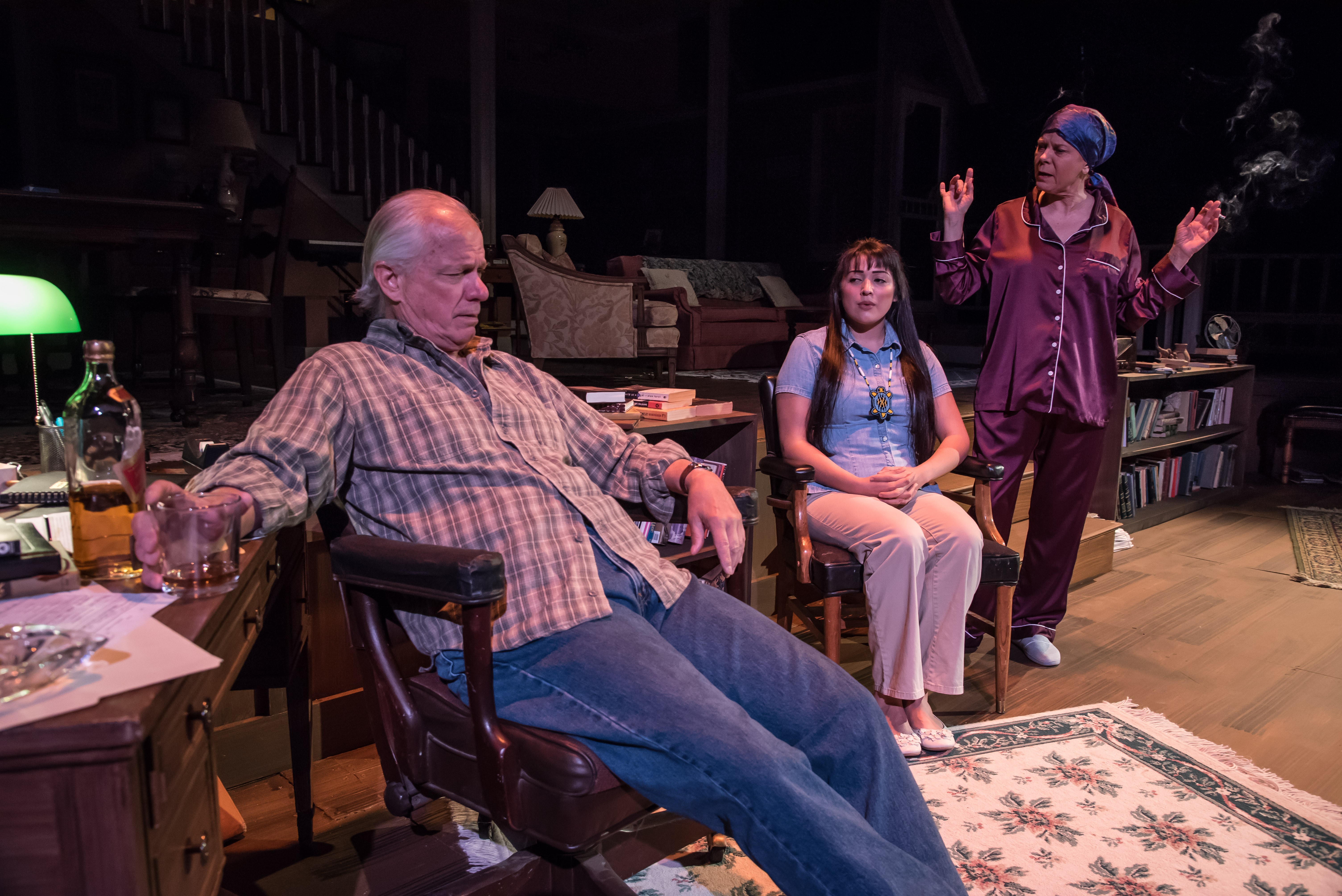
August Osage County
A little Clapton goes a long way for me, so when I walk out of the theater after a production of August: Osage County — an American family drama that’s all T.S. Elliot up front; Derek and the Dominos in back — I don’t hear ol’ Slow Hand’s signature guitar cutting through the piano swells. I hear something else entirely. I hear a verse from one of the most famous musicals in history sung in the caustic yet familiar voices of the South Park gang:
“We know we belong to the land
And the land we belong to is grand!
And when we say
Yeeow! A-yip-i-o-e-ay!
We’re only sayin’
You’re doin’ fine, Oklahoma!
Oklahoma, O.K”
So tell me Oscar Hammerstein, what if it’s just land? What if there’s nothing grand about it? What if the great plains aren’t a great geographic feature but a terrible existential condition — “like the blues”? Or a horror-movie curse resulting from too many white men’s estates being built over the spot where a native culture was buried?
Can’t help it, it’s just what Tracy Letts’ grand pastiche of the American family tragedy does to me. Standing tall on the shoulders of Edward Albee, Sam Shepard, Tennessee Williams and the women in Shakespeare’s King Lear, this Pulitzer-winning story of a death in the Weston family, forced reunion, and the inevitable struggle to reclaim order and tradition, all take place in the shadow of one unrepeated moment of true greatness. It’s a bitter, withering comedy about bitterness, withering, and a world that ends with whimpering not a bang. Theatre Memphis’ neatly crafted production gets a lot right, but suffers from pacing issues and fuzzy character development.
Beverly Weston was a cowboy poet — a rugged creature of the West and raging aesthete all in one package — a one-hit-wonder whose first and only book made him a superstar. He was hopeless at the end, living in his library and past glory. The only contact we have with Beverly before he takes his plunge into the great unknown is the job interview where he hires a Native-American housekeeper and charges her to not just cook and clean, but to live in the house like it was hers. Seems the old douche, having glimpsed the end of the world, couldn’t resist an opportunity to disrupt things with a poetic flourish.
Bev drinks. His wife takes pills and dances spasmodically to old Clapton records. She has a foul, slurring mouth and her foul, slurring mouth has cancer. Instead of dividing the family estate into three parts between the daughters, she’s keeping everything but the old used furniture. Plans to make a blast of her final chapter with nice new things, songs with a beat, and a lot of prescription drugs.
Two of the daughters abandoned Osage County. The eldest followed her (soon to be separated) college professor husband when he got an offer he couldn’t refuse. The youngest chased a fantasy of romance and let the winds blow her all the way to Florida, where she’s met the man of her dreams — a sleazy businessman, serial husband, and compulsive pedophile.
The middle kid stayed home and took care of everybody but herself until, very recently she decided to start over in New York with her first cousin, and the true love of her life.
[pullquote-1] From the isolated patriarch to the rebellious and vulnerable teen, there’s not much originality in the plot. We’ve encountered all these characters and situations before. We’ve seen every piece of this puzzle in other plays and works of fiction. What’s special is how Letts stitches it all together while pushing the characters in his story of American collapse, to the brink of parody and dark farce.
Director Jerry Chipman gets some great performances from his supporting cast. Matthew Hamner is almost too good as the show’s smarmy pedo who comes on like a best pal, and Gabriella Gonzalez is just as convincing as his intended teenage target. As the youngest of the Weston daughters, Emily F. Chateau is as fragile as a glass unicorn and seems as likely to cut you, if broken. Emily Peckham is the embodiment of good old gal zest, Sarah Solarez epitomizes patience in the face of an exploding family volcano, and Greg Boller is convincing as a college professor trying to do right by the family he wronged.
The ensemble play’s more central characters never seem quite as focused or finely crafted and its herky-jerky pacing sometimes made the three-hour show a bit of an endurance test. It’s a test that’s still worth taking.
August: Osage County arrived in 2008, and its “rot in the heartland” themes reflected an especially cynical moment in American history. Today, as we wrestle with the meaning of greatness, and grandness, and the land we belong to, this show, overstuffed as it is with marital infidelity, incest, child molestation, fibs, lies, falsehoods and fucking Clapton, seems almost quaint.